




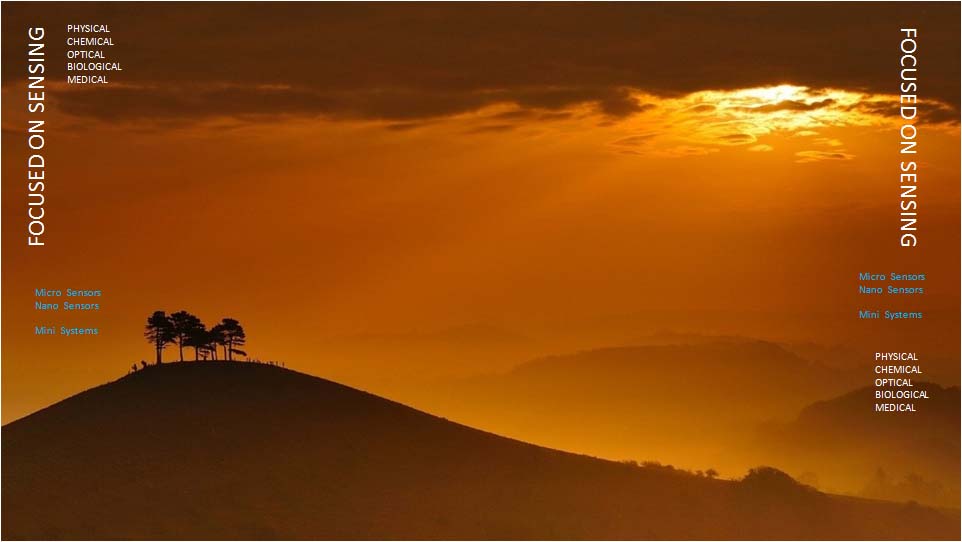





Waddan Systems was founded in 1988 in Valencia, California, to design, develop, manufacture, and market low cost monolithic sensors for the U.S. defense industry and NASA. Since its inception, through a comprehensive development program, the company has developed several sensors and systems using a spectrum of sensor micromachining technologies that include bulk micromachining, surface micromachining, laser micromachining and micromolding. Waddan Systems operates a wafer fabrication facility, handling wafers up to 100mm (4")in diameter, with furnaces, dielectric and metallic film deposition and sputtering stations, dicing saws, laser machining center, mask fabrication, PCB process and assembly (0603) and multiple test stations.
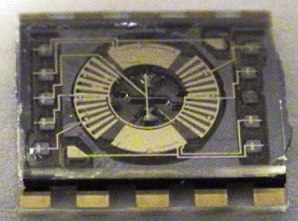 A single instrument measures only one measurand, e.g. temperature, pH, weight etc.
If the measurand is a vector in space, then a single instrument usually measures a
component of the vector and is designed to be insensitive to cross-axis inputs.
Waddan's single instruments include accelerometer, gyro, hydrophone, radiation sensor,
gas sensors and emerging blood and water analysis devices. The device shown in the
adjoining photo is a closed loop gyro with an oscillating rotor with axis of rotation
normal to the device plane.
More >
A single instrument measures only one measurand, e.g. temperature, pH, weight etc.
If the measurand is a vector in space, then a single instrument usually measures a
component of the vector and is designed to be insensitive to cross-axis inputs.
Waddan's single instruments include accelerometer, gyro, hydrophone, radiation sensor,
gas sensors and emerging blood and water analysis devices. The device shown in the
adjoining photo is a closed loop gyro with an oscillating rotor with axis of rotation
normal to the device plane.
More >
 In an instrument cluster several instruments are mounted together in
one location where they have to either operate or function together.
The inertial measurement unit (IMU) cluster shown in the adjoining photo
incorporates seven instruments, a triad of accelerometers to measure the body
acceleration, a triad of gyros to measure body angular rate, and thermister
for temperature measurement.
In an instrument cluster several instruments are mounted together in
one location where they have to either operate or function together.
The inertial measurement unit (IMU) cluster shown in the adjoining photo
incorporates seven instruments, a triad of accelerometers to measure the body
acceleration, a triad of gyros to measure body angular rate, and thermister
for temperature measurement.
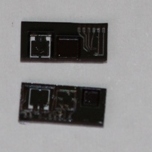 In an integrated sensor (IS) several instruments are
co-fabricated in one chip as an electronics IC analog. A simple IS could be a gyro and
accelerometer chip for one axis of an IMU, or an IS for measuring the flutter vibration,
aerodynamic pressure, temperature and strain on the skin of an air vehicle (see adjoining photo),
or a multi-integrated-optics-chip (MIOC) with several modulators, polarizers, splitters etc all
made in a single chip.
In an integrated sensor (IS) several instruments are
co-fabricated in one chip as an electronics IC analog. A simple IS could be a gyro and
accelerometer chip for one axis of an IMU, or an IS for measuring the flutter vibration,
aerodynamic pressure, temperature and strain on the skin of an air vehicle (see adjoining photo),
or a multi-integrated-optics-chip (MIOC) with several modulators, polarizers, splitters etc all
made in a single chip.
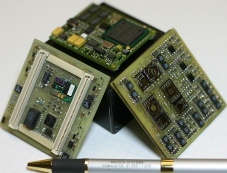 A miniature system incorporates sensing instruments for
an application, their operational and interconnect electronics, micro-controllers/micro-processors
with storage memory, and an I/O interface for the outside world. The I/O interface may consist of
a small display and a keypad, or touch-sensitive display or standard serial and parallel ports.
The adjoining photo shows Waddan's TSPIGII which is a miniature inertial navigation system with an
embedded GPS. The I/O includes a USB 2.0, Ethernet and an RS232.
A miniature system incorporates sensing instruments for
an application, their operational and interconnect electronics, micro-controllers/micro-processors
with storage memory, and an I/O interface for the outside world. The I/O interface may consist of
a small display and a keypad, or touch-sensitive display or standard serial and parallel ports.
The adjoining photo shows Waddan's TSPIGII which is a miniature inertial navigation system with an
embedded GPS. The I/O includes a USB 2.0, Ethernet and an RS232.
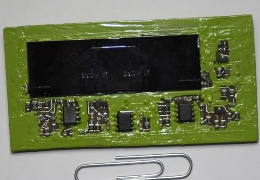 The sensor is made up of rectangular optical waveguides filled with a nano-pore gel.
The optical transmission of a 1650nm laser through the waveguides is affected by the
amount of methane soaking the nano-pores of the waveguides. The network employs the
ZigBee protocol.
The sensor is made up of rectangular optical waveguides filled with a nano-pore gel.
The optical transmission of a 1650nm laser through the waveguides is affected by the
amount of methane soaking the nano-pores of the waveguides. The network employs the
ZigBee protocol.
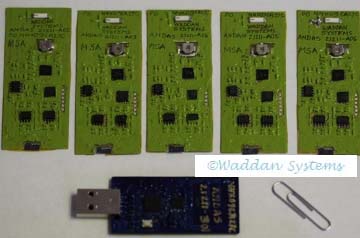 The nodes of a wireless monitoring system are shown in the adjoining photo.
The system employs the IS shown above for measuring acceleration (random vibration),
aerodynamic pressure, a strain gage rosette and temperature. The node is battery
operated, and a power management scheme allows a long operational life. This network
also employs the ZigBee protocol. For data acquisition any PC with a USB interface can be used.
The network data collection app runs on the PC and controls all the nodes via the USB Host
shown as the bottom board in the photo.
The nodes of a wireless monitoring system are shown in the adjoining photo.
The system employs the IS shown above for measuring acceleration (random vibration),
aerodynamic pressure, a strain gage rosette and temperature. The node is battery
operated, and a power management scheme allows a long operational life. This network
also employs the ZigBee protocol. For data acquisition any PC with a USB interface can be used.
The network data collection app runs on the PC and controls all the nodes via the USB Host
shown as the bottom board in the photo.
